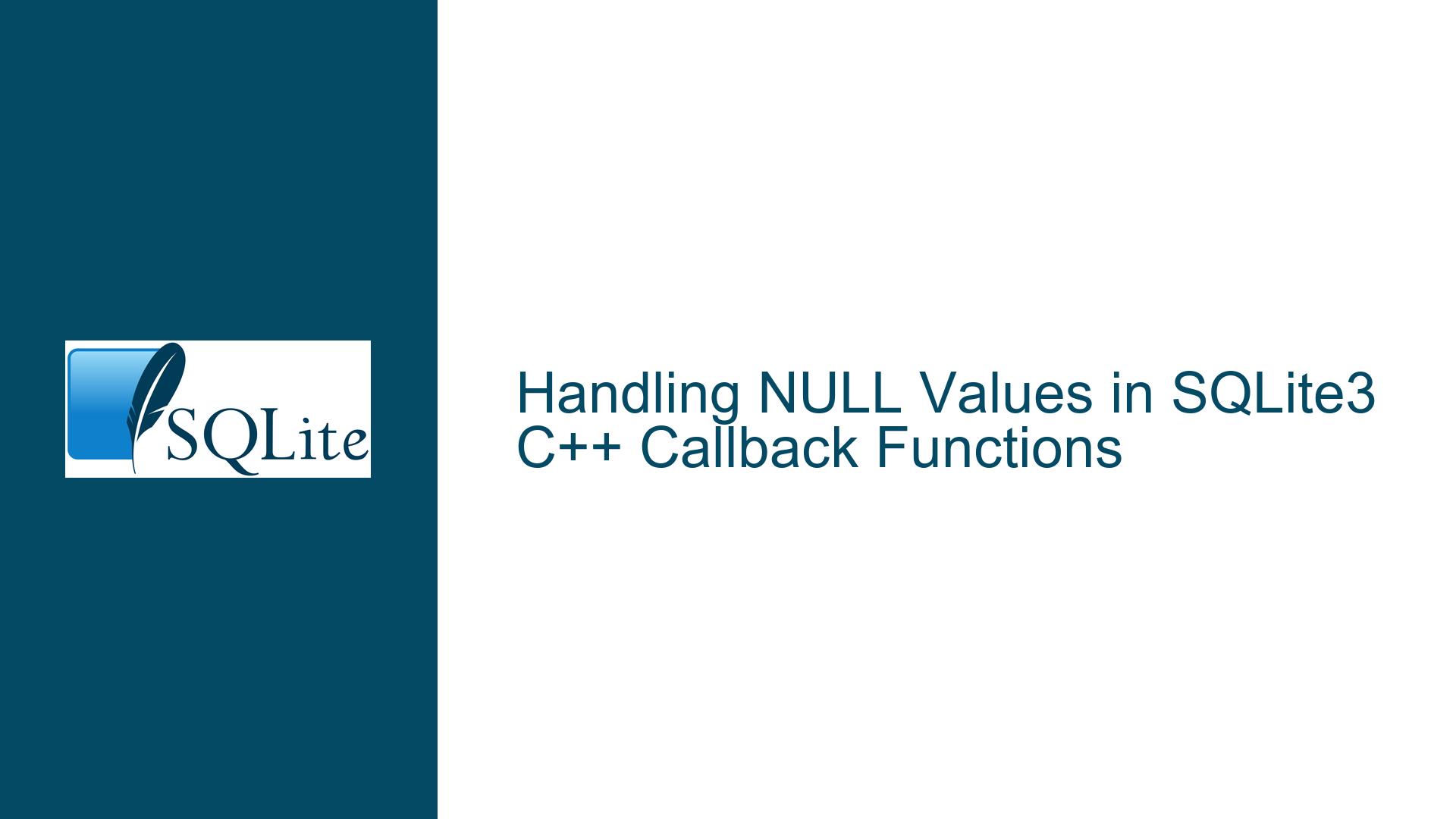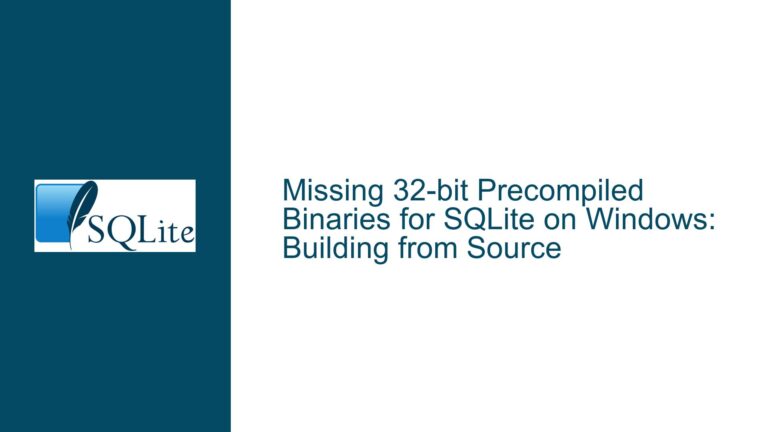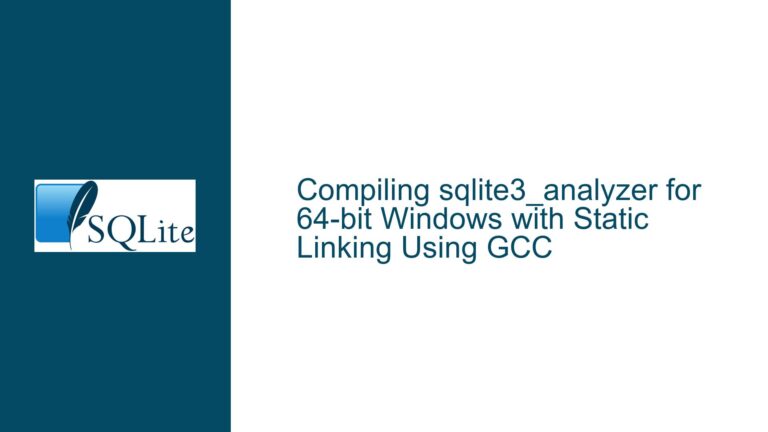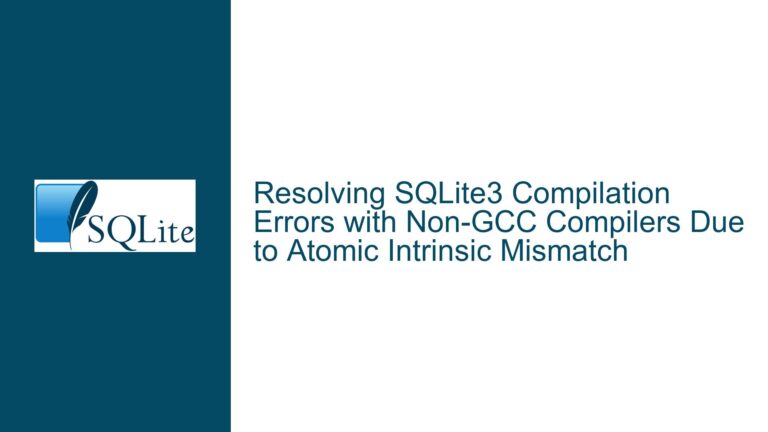Handling NULL Values in SQLite3 C++ Callback Functions
Understanding NULL Value Handling in SQLite3 C++ Callback Functions
When working with SQLite3 in C++, one of the most common tasks is executing SQL queries and processing the results using a callback function. The callback function is invoked for each row of the result set, and it is responsible for handling the data returned by the query. However, a common issue arises when the callback function encounters NULL values in the result set. This issue can lead to runtime errors, such as access violations, if not handled properly. The core of the problem lies in how C++ handles NULL pointers, especially when they are passed to functions or operators that expect valid C-style strings.
In the context of SQLite3, NULL values in the result set are represented as NULL pointers in the argv array passed to the callback function. When these NULL pointers are dereferenced or passed to functions that do not handle NULL values gracefully, the program may crash or exhibit undefined behavior. This is particularly problematic when using C++’s std::cout to print the values, as the << operator for const char* does not handle NULL pointers safely.
The Role of argv and azColName in SQLite3 Callback Functions
The SQLite3 callback function is defined with the following signature:
int callback(void* NotUsed, int argc, char** argv, char** azColName);
Here, argc represents the number of columns in the result set, argv is an array of strings representing the values in the current row, and azColName is an array of strings representing the column names. Each element in the argv array corresponds to a column in the result set, and if a column contains a NULL value, the corresponding element in argv will be a NULL pointer.
The issue arises when the callback function attempts to print or otherwise process these values without first checking whether they are NULL. For example, consider the following code snippet:
std::cout << azColName[i] << " : " << argv[i] << '\n';
If argv[i] is NULL, the << operator will attempt to dereference the NULL pointer, leading to undefined behavior. This is because the << operator for const char* assumes that the pointer it receives is valid and points to a null-terminated string. When a NULL pointer is passed, the behavior is undefined, and the program may crash or throw an access violation error.
The Importance of Proper NULL Handling in C++
In C++, handling NULL values correctly is crucial for writing robust and error-free code. This is especially true when working with C-style strings, as NULL pointers are commonly used to represent missing or undefined values. When dealing with SQLite3 callback functions, it is essential to check each value in the argv array for NULL before attempting to process it. This ensures that the program can handle NULL values gracefully and avoid runtime errors.
One common approach to handling NULL values in C++ is to use conditional (ternary) operators to provide a default value when a NULL pointer is encountered. For example:
std::cout << azColName[i] << " : " << (argv[i] ? argv[i] : "NULL") << '\n';
In this code, the ternary operator checks whether argv[i] is NULL. If it is not NULL, the value of argv[i] is printed. If it is NULL, the string "NULL" is printed instead. This approach ensures that the program does not attempt to dereference a NULL pointer, thus avoiding undefined behavior.
The Relationship Between std::string and const char* in C++
Another aspect of the problem involves the relationship between std::string and const char* in C++. When a const char* is passed to std::cout, the << operator for const char* is invoked. However, if the const char* is NULL, the behavior is undefined. This is because the << operator assumes that the pointer is valid and points to a null-terminated string.
One might think that converting the const char* to an std::string would solve the problem, as std::string can handle NULL pointers by treating them as empty strings. However, this approach introduces unnecessary overhead, as it involves creating a temporary std::string object. Moreover, the std::string constructor that takes a const char* does not handle NULL pointers gracefully, and passing a NULL pointer to this constructor can still lead to undefined behavior.
Therefore, the most efficient and safe way to handle NULL values in this context is to use the ternary operator to check for NULL pointers and provide a default value when necessary. This approach avoids the overhead of creating temporary std::string objects and ensures that the program behaves correctly when NULL values are encountered.
Common Pitfalls and Misconceptions
One common misconception is that the << operator for const char* can handle NULL pointers safely. This is not the case, as the behavior of the << operator is undefined when a NULL pointer is passed. Another misconception is that converting a const char* to an std::string will automatically handle NULL pointers. While std::string can handle NULL pointers by treating them as empty strings, this approach is not efficient and can still lead to undefined behavior if the std::string constructor is not used correctly.
Another pitfall is assuming that all database columns will always contain non-NULL values. In reality, NULL values are a common occurrence in databases, and it is essential to handle them properly in the application code. Failing to do so can lead to runtime errors and unpredictable behavior.
Best Practices for Handling NULL Values in SQLite3 Callback Functions
To handle NULL values in SQLite3 callback functions correctly, follow these best practices:
Always Check for NULL Pointers: Before processing any value in the
argvarray, check whether it is NULL. This can be done using a simple conditional statement or a ternary operator.Provide a Default Value for NULL Pointers: When a NULL pointer is encountered, provide a default value that can be safely processed. This could be a string like "NULL" or an empty string, depending on the requirements of your application.
Avoid Unnecessary Conversions: While it may be tempting to convert
const char*values tostd::stringto handle NULL pointers, this approach introduces unnecessary overhead. Instead, use the ternary operator to handle NULL pointers directly.Test with NULL Values: When writing and testing your callback function, ensure that it can handle NULL values correctly. This can be done by running queries that return NULL values and verifying that the callback function processes them without errors.
Document NULL Handling: Clearly document how NULL values are handled in your callback function. This will help other developers understand the code and ensure that NULL handling is consistent throughout the application.
Example Implementation of a Robust Callback Function
Here is an example of a robust callback function that handles NULL values correctly:
int callback(void* NotUsed, int argc, char** argv, char** azColName) {
for (int i = 0; i < argc; ++i) {
std::cout << azColName[i] << " : " << (argv[i] ? argv[i] : "NULL") << '\n';
}
std::cout << '\n';
return 0;
}
In this implementation, the ternary operator is used to check whether argv[i] is NULL. If it is not NULL, the value of argv[i] is printed. If it is NULL, the string "NULL" is printed instead. This ensures that the program does not attempt to dereference a NULL pointer, thus avoiding undefined behavior.
Conclusion
Handling NULL values in SQLite3 callback functions is a critical aspect of writing robust and error-free C++ code. By understanding the relationship between const char* and std::string, and by following best practices for NULL handling, you can ensure that your callback functions process NULL values gracefully and avoid runtime errors. Always check for NULL pointers, provide default values when necessary, and avoid unnecessary conversions to ensure that your code is both efficient and reliable.






